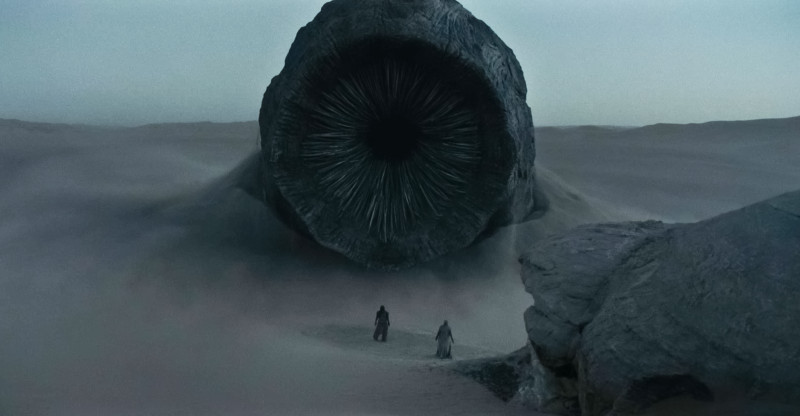Dune: Villeneuve, Lynch, Herbert
Dune: major blockbuster or multi-part franchise approach?
Lovers of Dune will be very aware of the vast differences between Frank Herbert’s 1965 novel, David Lynch’s 1984 film, and Denis Villeneuve’s ongoing Dune trilogy. This blog is interested in Dune as a piece of popular media, particularly the ways Villeneuve and Lynch’s films deviate from Herbert’s novels, respectively.
Much of the criticism around Villeneuve’s Dune centred on its runtime and pacing, despite the fact Villeneuve has made clear his adaptation will track Herbert’s story over the course of three films, not just the one. Audiences then cannot expect a fully fledged story in the first instalment of a three part franchise. Although given that David Lynch’s film compressed the entirety of Herbert’s novel into just over two hours, Villeneuve’s Dune seems anomalous not only to the franchise but in modern cinema more widely. “What do you mean there’s still more to go?” audiences rage. Patience is a virtue, so they say, but some audiences seem to prefer the one-and-done approach. (Not that there’s anything wrong with that, but I’d like to argue there’s some value in waiting and watching a story unfold slowly, unhurriedly.)
This may be controversial, but I do want to ask - is Villeneuve’s approach to adapting Frank Herbert’s novel a blueprint for how adaptation of literature should be done?
I ask because there are ways in which Villeneuve’s adaptation is very faithful to Herbert’s novel (namely the highly critiqued pacing), whilst Lynch’s adaptation seems to have a very different aim. In short, whilst Lynch’s film is an adaptation of a novel to fit the expectations of a film audience, Villeneuve’s film adapts the film medium to remain true to the novel. Herbert’s novel is a multi-chapter saga which gives space to create a whole universe, and Villeneuve’s film honours this, but that’s not to say Lynch’s is a poor adaptation for not taking the same approach.
Admittedly, Villeneuve’s Dune is a long film, not an awful lot happens per se, and where Villeneuve ends his film in relation to the wider story, does leave audiences feeling that just as we’re getting somewhere, we’ve hit the two-and-a-half hour mark and that’s all we’re getting for today. But what Villeneuve used that screen time to do really effectively was world-building. The film gives time and attention to the landscapes, the aesthetics and political atmosphere of Arrakis and the wider fictional universe of Herbert’s Dune. It establishes the all-important relationships between characters and how they are relevant to the journey Paul will embark on. Yes, the film can feel like it’s dragging at times, but it does reflect Herbert’s writing style and narrative structuring.
Does this mean that Villeneuve’s Dune is “better” than Lynch’s? I don’t necessarily think so. Whilst it’s interesting to see an adaptation which emulates its source materials in this way, there are reasons why it’s received the critique it has. Pacing is also a bugbear for some readers of the novel, and whilst I could defend the novel and say something like the slowness of the plot’s progression represents something or other in relation to something or other, I really don’t think that argument would fly. Pacing is an issue, but that doesn’t make the whole novel a bad piece of writing. Let’s face it, if Twilight can make it big, maybe as readers it turns out we’re often simple creatures with simple pleasures.
In comparison, Lynch’s film changes more of the stylistic pacing of Herbert’s novel in favour of a more compact two hour film. Lynch’s adaptation is an example of how to adapt a successful novel into a successful sci-fi blockbuster; Villeneuve’s adaptation is an example of how to adapt a book’s written style into the language of film. Both films are adapting the same book, and both do it well, but take very different approaches, so it just depends really on what you look for in an adaptation, and possibly also your familiarity with the source text - quite frankly, if you don’t care about the specifics of the adaptation process, then you’ll have an entirely different take on the films, may like or dislike them for other reasons. You might prefer Villeneuve’s world-building (including that very dramatic soundtrack); you might prefer the 1980s sci-fi aesthetic of Lynch’s film, and its idiosyncratic special effects. You get the idea.
Nevertheless, the two films are doing different things, and have a different focus when it comes to adaptation. At the end of the day, the two films provide very different and individual versions of Frank Herbert’s novel, and there is something to be appreciated in both.
_First_edition.jpg/220px-Dune-Frank_Herbert_(1965)_First_edition.jpg)



.jpg)

Comments
Post a Comment